Meet the Sheffield man who made an industrial-sized coffee roaster by hand for his business - saving himself £30,000
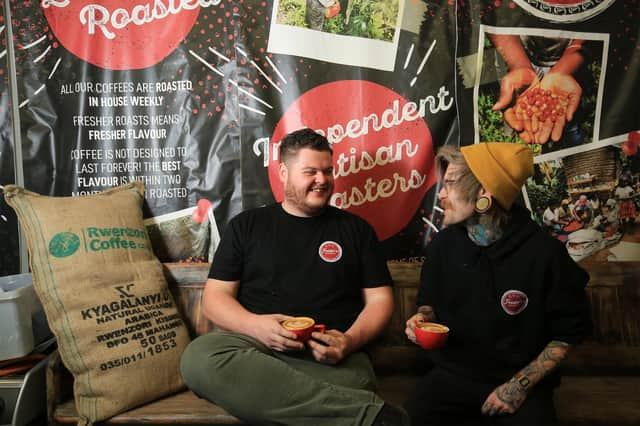

Most of us will know someone who is adept at fixing things, and can be called upon to try their hand at a myriad of jobs around the house.
33-year-old Frazer Habershon took that to a whole new level when he decided to build his own coffee roaster, a heavyweight piece of machinery that would normally cost between £30,000 and £35,000.
Advertisement
Hide AdAdvertisement
Hide AdPrior to this, Frazer was roasting all of the coffee for his burgeoning Sheffield business, Frazer’s Coffee Roasters, using another homemade creation comprised of a barbecue and a crank.
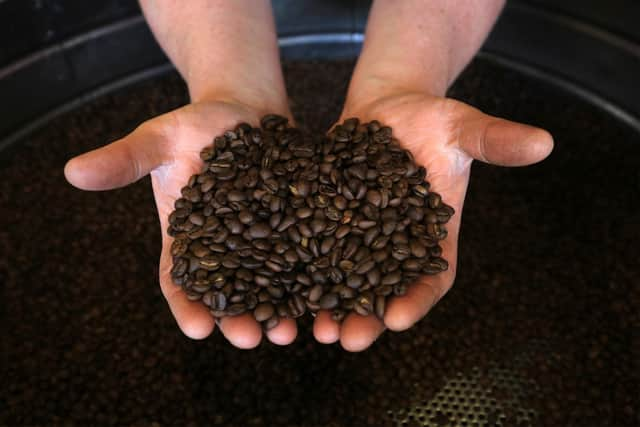

"I didn’t have the money at the time [to invest in equipment]. I had to do it all by hand cranking, and became really jacked on the one side,” laughed Frazer.
He spent 18 months using the barbecue to roast the coffee, and due to the appetite for Frazer’s coffee being so ferocious, it took him six months to make the roaster.
“I bought a steel drum from a supplier, I put in an extraction system, fitted the gas supply, just did it all by hand,” he explained.
Advertisement
Hide AdAdvertisement
Hide Ad"I can weld, I’m a plummer, I’m a gas engineer, and thought I bet I can make my own roaster...I didn’t want to take out a huge loan to buy a coffee roaster when I was getting started.”
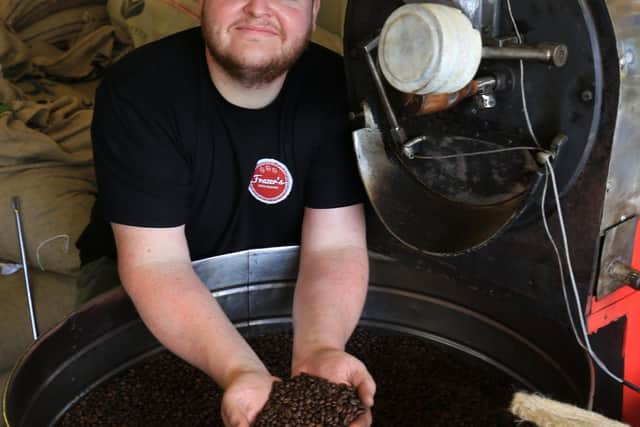

After speaking with those in the coffee trade, Frazer believes he might be one of only two people in the UK to have created a homemade coffee roaster, and the only person to have made one on an industrial scale.
Five years and two new premises later, Frazer is about to complete work on his second coffee roaster, the consequence of which will see the amount of coffee he can roast double overnight; he is currently in talks with Morrisons about them stocking his coffee locally, with an emphasis on cold brews, and his business is expanding at such a rate that he has just bought a shipping container for storage to help him keep up with demand.
It’s not just the coffee roaster that has been made by Frazer. As you look around his business space and see the counter and cold brew tanks that he has made by hand, it is clear that he applies his DIY sensibilities to most aspects of his operation.
Advertisement
Hide AdAdvertisement
Hide AdFrazer’s love of coffee was borne out of having a curious mother who encouraged him to try lots of different types of food and drink, which originated from numerous different cultures, as he was growing up.
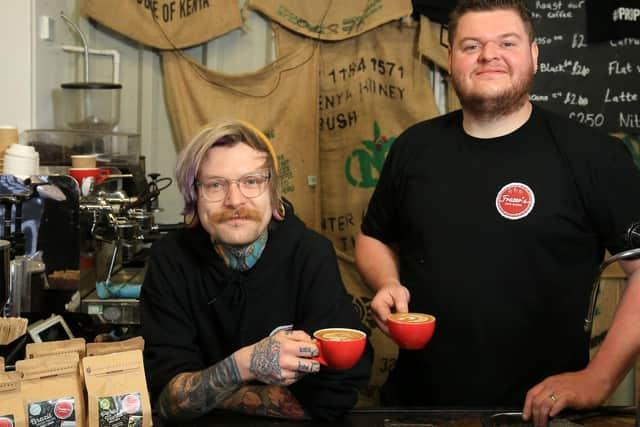

This led to him developing a passion for coffee, which in turn, guided him towards a career in the industry, beginning with a role with coffee chain, Caffe Latte.
During his time with them, Frazer was given the opportunity to travel help them set up franchises all across the country.
"I got to see the roasting side of things and became really interested in it,” said Frazer.
Advertisement
Hide AdAdvertisement
Hide AdBy this time, Frazer had started home roasting after a friend taught him the first of many DIY techniques that would come to define his coffee journey, and saw him roasting coffee beans using a frying pan.
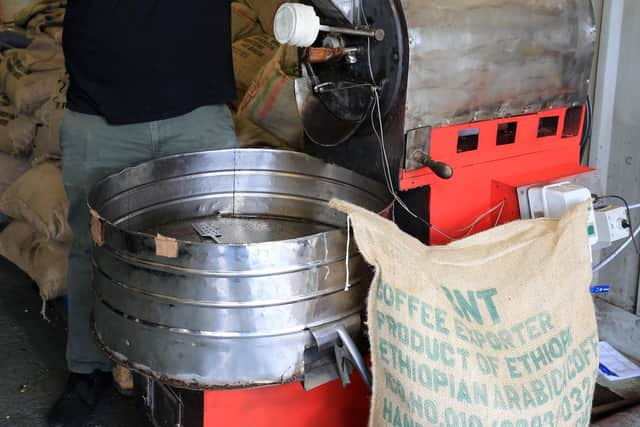

But after a while, Frazer decided he wanted to stop travelling and started working for Sheffield institution, Tamper Sellers Wheel.
"They were the first in Sheffield doing good coffee, coffee that we, in the industry, recognise as specialty coffee. I got to learn lots about the industry, lots about being front of house,” he said.
"While I was there I decided to set up my roasting business, which was June 2014,” he said.
Advertisement
Hide AdAdvertisement
Hide AdWithin a few months of starting the business Frazer managed to get his coffee stocked at a Meadowhall coffee shop and at the popular Peddler’s Market, and before long, he was being inundated with orders.
"The owner of Tamper, in the nicest possible way was like: ‘You need to leave, you’re clearly very good at this. Your phone never stops ringing. Sheffield needs more roasters, and I’ve got to get my coffee from London, so go and give it a go’.”
Frazer took that advice and began roasting full time, at which point business really began to take off.
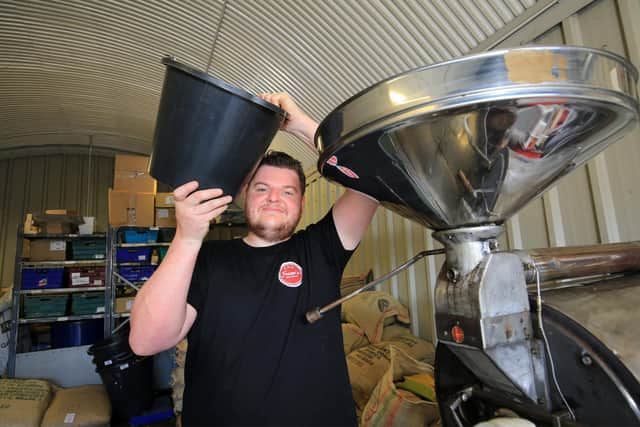

"I was roasting from my garage, and it just went nuts. At points I was roasting for 16 hours a day. As soon as I was established at Peddler’s, things changed overnight. I went from not knowing a great deal about the industry, to deciding to open a roastery within three months,” explained Frazer.
Advertisement
Hide AdAdvertisement
Hide AdAs the business began to grow, Frazer decided he would need to move the operation out of his garage and into a small, 200 square foot premises on Effingham Road, Attercliffe that was once used as the location where industrial workers would go to get their payslips stamped.
From there, Frazer moved to a 500 square foot premises in Carbook, behind Forgemasters, before moving to his current location under the railway arches on Wilson Street, Neepsend. Arron Mills joined the business along the way, and is now Frazer’s right hand man.
Today, things are looking bright. And with the completion of his second hand-made roaster just around the corner, Frazer is beginning to run out of space.
He hopes to set up a coffee shop, and to have a space where he can train baristas, and is currently in talks with the owner of empty railway arch space next to his premises about taking them over. But for now, he is about to have a shipping container delivered to provide him with some extra space while he works out his next move.
Advertisement
Hide AdAdvertisement
Hide AdFrazer’s Coffee Roasters is also one of 12 suppliers that have been selected for the new Independent Yorkshire Shop which opened at Meadowhall earlier this month.
Discussions with Morrisons could also see his cold brews, as well as his coffee stocked in some of their Yorkshire and Derbyshire supermarkets, and says he is keen to restrict their arrangement to a local supply chain.
Another important part of Frazer’s ethos is sourcing coffee ethically and sustainability, and ensuring it is as fresh and as flavoursome as possible.
The coffee supply chain varies from country to country; but it is inherently long and complex. It traditionally involves a number of intermediaries, who are involved at many stages of the chain, as well as Government agencies, exporters and dealers/brokers who supply roasters with coffee.
Advertisement
Hide AdAdvertisement
Hide AdThe convoluted supply chain often drives down the money earned by farmers and producers.
Frazer explains that this process can often result in coffee cherries and green beans being kept in warehouses for years, and while the nature of the product means it is possible to store them for long periods of time, it has a detrimental impact on the flavour.
"If you go through a coffee trader, it can be sat in a warehouse for two or three years. You do get good coffee traders who get it into shops quickly, but the vast majority put it into a warehouse. Green coffee can be stored for a long time but the quicker you can get it roasted, the better it tastes,” said Frazer.
Frazer has been dealing directly with farmers in coffee producing countries such as Brazil and Uganda since 2016, and believes that not only is it a “more ethical and sustainable” way to source coffee, but it is also more cost-effective and ensures farmers earn a higher price for their product.
Advertisement
Hide AdAdvertisement
Hide Ad"The money we save through cutting out a lot of parts of the process, we use to pay farmers more,” he explained.
And crucially, cutting out unneccesary – and costly – links in the supply chain also means it is possible for coffee to go from tree to cup far more quickly, resulting in coffee that is more flavoursome.
Frazer aims for his coffee to be roasted within three months of it being harvested.
He is passionate about following the seasonality of coffee in the countries he sources from, which ensures that a fresh supply is constantly “trickling” in.
Advertisement
Hide AdAdvertisement
Hide AdHe travelled to Uganda for an “origin trip” in October 2019, when he got to meet some of the farmers he trades with.
"It was great because we got to talk about what we’re doing on our end, and to discuss the different methods that can help to improve the coffee...the idea is if we can make the quality of the coffee being produced of the highest possible calibre, while paying more and helping to invest in the infrastructure in places like Uganda, then everyone wins.”